Planning and Testing Approaches to Transformative Education
Partners in the education project "New qualification offers for 'change agents'" gather in Wuppertal
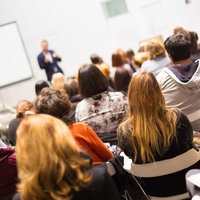
Partners in the education project "New qualification offers for 'change agents'" gather in Wuppertal
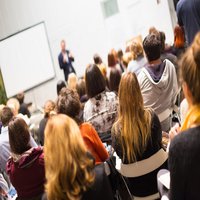
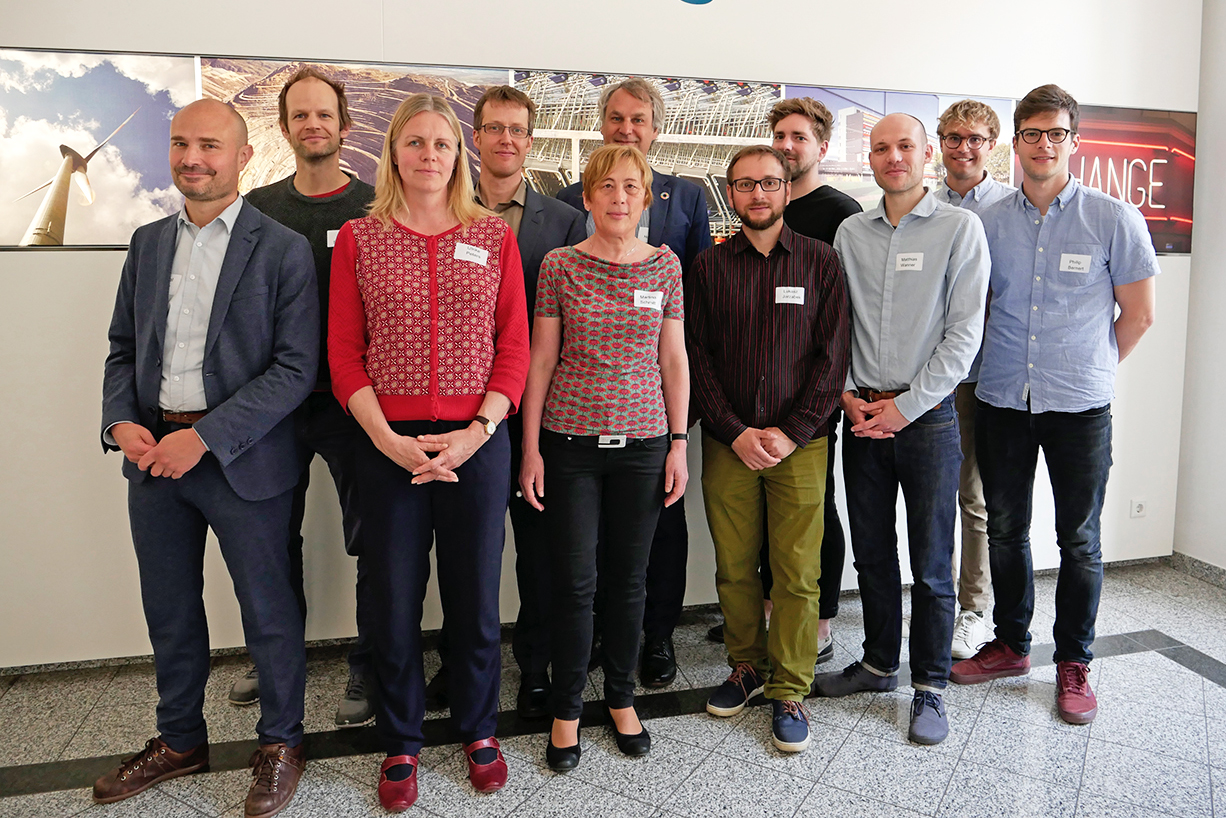
The Wuppertal Institute's new research project led by Matthias Wanner, entitled "Development, testing and dissemination of new qualification offers for 'change agents' for transformative learning using the real-world laboratory approach" (abbreviated from the German as EEVA), was launched with a one-day workshop on 15 May 2018 in the presence of guests from around the world. The project is taking place in collaboration with the Leuphana University of Lüneburg and the Institut Futur (futures research institute) at Freie Universität Berlin. The German Federal Environmental Foundation (DBU) will be providing specialist and financial support for three years. The project aims to enable students at both universities to establish and run their own small, interdisciplinary "transformative innovation labs" as part of their master’s theses.
If we are to achieve a large-scale transformation towards sustainability, there will need to be stakeholders who are capable of reflection and transformative thinking, termed sustainability change agents. The skills required can be acquired and practised. Universities and colleges are suitable locations for interdisciplinary and transformative research and education and their application. The project "Development, testing and dissemination of new qualification offers for 'change agents' for transformative learning using the real-world laboratory approach" (abbreviated from the original German as EEVA), provides students with methodological and practical knowledge so that they can use scientific tools to actively participate in shaping society in the direction of sustainable development.
Through the EEVA project, the Wuppertal Institute will be supporting around 40 students from the Leuphana University of Lüneburg and Freie Universität Berlin from October 2017 to December 2020 as they carry out independent, interdisciplinary and transformative research. In their individual real-world laboratory master’s theses, which will become "transformative innovation labs", they will be making a small contribution to the "large-scale transformation". The universities will also be further developing the didactic concept of real-world laboratories for sustainability education and implementing it in concrete educational projects. In this way, new models of transformative sustainability education are being developed and tested. The objective is to implement, support and reflect upon the process by which skills are gained. Furthermore, the project aims to pave the way for the dissemination of transformative educational and research methods, such as real-world laboratories, by means of multipliers at national and international level.
Kick-off meeting and workshop at the Wuppertal Institute
The kick-off meeting for the EEVA project was held at the Wuppertal Institute on 15 May 2018. The workshop was an opportunity to exchange ideas with Sweden's Chalmers University of Technology, which has been developing similar modules very successfully under the name "Challenge Labs". The joint development of a simulation game based on the Sustainable Development Goals (SDGs) with the project's Polish partner, the Centre for Systems Solutions, was also on the agenda.
The project meeting was attended by the three project partners. The Wuppertal Institute was represented by the project coordinator Matthias Wanner, who was joined by Martina Schmitt and Dr. Justus von Geibler from the Sustainable Production and Consumption department. Professor Daniel Lang, Professor for Transdisciplinary Sustainability Research, and Philip Bernert, coordinator of the case study office, took part on behalf of Leuphana University. Sascha Dannenberg, coordinator of the master’s programme in Futures Studies, was present as a representative of Freie Universität Berlin.
Professor John Holmberg, Professor of Physical Resource Theory, and his colleague Johan Larsson travelled from the Chalmers University in Gothenburg to offer their input and advice. The Challenge Labs were devised at their institution, which also won the United Nations Environment Programme's Global Universities Partnership on Environment and Sustainability Green Gown Award in 2016. The two colleagues reported on their experiences with this approach to education and the importance of transformative teaching and learning formats for the development of university teaching. Another guest was Lukasz Jarzabek from the Centre for Systems Solutions (CRS) in Poland. CRS is developing a game to communicate the complexity of the SDGs on behalf of the EEVA project, a precursor of which was presented at the workshop.
The German Federal Environmental Foundation (DBU), based in Osnabrück, was represented by its specialist in transformative sustainability education projects, Ulrike Peters, who is providing support with regard to content for the DBU-funded project. Ms Peters stated that: "Transformative education and learning in real-world laboratories is still a very open approach that can be shaped by concrete examples. In supporting transformative methods of sustainability education, the DBU prioritises the educational aspect. In real-world laboratories, ideas from society relating to sustainable development – supported or inspired by scientists – can be tested out by members of the public on a project basis. It is therefore a method of social learning to support a transformation towards sustainability."
Game focusing on Sustainable Development Goals in preparation
The meeting included the planning of a major workshop on the theme of "Real-world laboratories, citizen science and so on: Transformative learning for sustainable development", which is scheduled to be held in Berlin in January 2019. Lukasz Jarzabek from CRS brought with him the interactive simulation game "The World's Future". In the game, which can run for up to six hours, 11 to 44 players are faced with tackling the challenges of a future with limited resources. There are plans to develop a game focusing on the Sustainable Development Goals (SDGs) on the basis of "The World's Future". "The game is one example of many innovative teaching and learning formats that make both the challenges of sustainable development and local starting points accessible to students in a clear and motivating way," said Matthias Wanner, coordinator of the EEVA project from the Sustainable Production and Consumption Division at the Wuppertal Institute.
First project phase close to completion
In the current first project phase, which will run until September 2018, the teaching and learning materials for the students will be prepared and the qualification option will be anchored within existing master's modules at the two universities. The teaching and learning materials will be developed by the project team on the basis of national and international examples and made available online over the course of the project. In the second project phase, which will run from October 2018 to September 2020, two cohorts of students will be supported and trained in the master’s degree phase using the materials and modules that have been developed. The aim is to facilitate the students in implementing their own interdisciplinary and transformative real-world laboratory master’s theses in cooperation with local partners operating in real-life situations. The students will be supported and assisted by means of a five-day joint kick-off retreat away from the universities to get them started on their own real-world laboratory research, with discussion workshops, digital/analogue blended learning and peer learning opportunities within student groups.
At the end of each year there will be a semi-public closing and presentation event. The second phase of the project will also include a large-scale dialogue and dissemination workshop with multipliers from the field of transformative sustainability education in Berlin. It will additionally consist of ongoing reporting as well as participation in national and international conferences. Taking place from January to December 2020, the third project phase will evaluate the two pilot year groups before adapting and finally disseminating the didactic concept.
The German Federal Environmental Foundation (DBU) will be providing specialist and financial support for the project from October 2017 to December 2020, including almost 270,000 euros in funding (project reference 33889).
Press release
Wuppertal Institut für Klima, Umwelt, Energie gGmbH (Wuppertal Institute)
Responsible for content: Professor Uwe Schneidewind, President
Contact details: Christin Hasken, Head of Communications and Public Relations
Tel.: +49 202 2492-187
Fax: +49 202 2492-108
E-mail: christin.hasken@wupperinst.org
Printable pictures
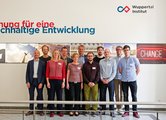
From the left: Professor Daniel Lang (Leuphana University), Niko Schäpke (Chalmers University), Ulrike Peters (DBU), Dr. Justus von Geibler (Wuppertal Institute), Martina Schmitt (Wuppertal Institute), Professor John Holmberg (Chalmers University), Lukasz Jarzabek (Centre for Systems Solutions), Till Heller (Wuppertal Institute), Matthias Wanner (Wuppertal Institute), Johan Larsson (Chalmers University) and Philip Bernert (Leuphana University). Source: Wuppertal Institute
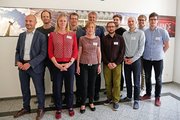
From the left: Professor Daniel Lang (Leuphana University), Niko Schäpke (Chalmers University), Ulrike Peters (DBU), Dr. Justus von Geibler (Wuppertal Institute), Martina Schmitt (Wuppertal Institute), Professor John Holmberg (Chalmers University), Lukasz Jarzabek (Centre for Systems Solutions), Till Heller (Wuppertal Institute), Matthias Wanner (Wuppertal Institute), Johan Larsson (Chalmers University) and Philip Bernert (Leuphana University). Source: Wuppertal Institute
